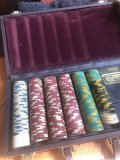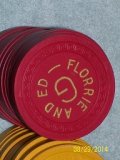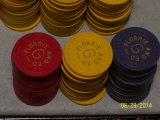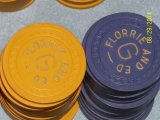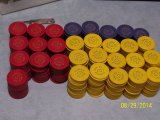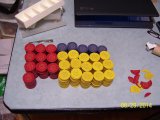Cool samples, bro.

The Samurais are well-regarded, and it's nice to have a T-Mold color set. Great to pick up and shuffle.

The key molds you have there are definitely plastic, not clay. There's some careful unpacking to be done regarding greek keys:
- Large Greek Keys were clay chips made by Burt Co and sold by BC Wills.
- Small Greek Keys were also clay chips made by Burt Co and sold by BC Wills.
- Medium Greek Keys were made by multiple vendors from multiple materials and in multiple slightly different styles:
- BCC made clay chips (compression-molded) using a mold owned by Joshua Dalton
- PGI (Palm Gaming) made china clays (injection-molded) using a medium greek key pattern which was different from the BCC clays. There were a couple of different spot patterns made: 4d14 (four positions, each position with two 1/4" spots) and 8v (eight positions, each position a v-shaped spot). With injection molding, different spot patterns require different molds, although different colors don't.
- Progen-80 chips were china clays made using a medium greek key pattern which was different from the BCC or PGI chips, using materials that were different from and inferior to the PGI chips. They used the same 4d14 spot pattern and color selection that the PGI 4d14 chips used (which, in turn, are modeled after a well-known spot and color set used by Paulson for some of their fantasy chips).
The samples you have are yet a fourth line of medium greek keys. They have the same key pattern as the Progen-80s, although it's a different mold because the line weights are slightly different. They use a 4d14 spot pattern, but the colors are different from the Progen-80 / PGI / Paulson fantasy colors. I've seen these before but for the life of me I can't find any posts about them again. I'm not certain whether they're china clays or slugged plastics, nor who makes them. The difference would be their weight; china clays will be 8-10g and slugged plastics will be 11-15g.
Not really possible, with few exceptions. A mold is designed to work with a particular molding process and a particular type of material. Injection molds such as used for china clays are very different from compression molds used for clays. Even compression molds aren't compatible across different manufacturers, as most of the manufacturers used different processes, equipment, and materials (even though they are all compression molding).
Exceptions:
Web molds were used by Burt Co, then Paulson, then
BCC. Paulson and
BCC were mostly compatible since
BCC was started by ex-Paulson people, but Paulson was very different from Burt Co. We still don't have a good understanding of how the Burt Co molds were adapted to the Paulson process.
Small Crowns and Large Crowns molds were used by
TRK, then later used by
CPC. David Spragg had to do extensive modifications to the molds to adapt them from the
TRK process to the
CPC process. He hasn't discussed the details of what those modifications were.
The Unicorn molds were mainly used for injection molding, but at some point they were modified to work with compression molding. As a consequence, most Unicorns are plastic, but some are clay. We still don't have a good understanding of how the molds were adapted from injection molding to compression molding.
As described above, a Greek Key pattern has been used many different times. No molds were adapted, though. Different manufacturers just made their own new molds using designs that somewhat resembled each other but were clearly different from each other.
Similarly, some other mold designs that were first used for clay chips have been reproduced in new molds used for injection molded plastic chips. The classic Dunes house mold springs to mind, as well as the Pharaoh's fantasy chips - both were first done in clay, but then later "tribute" chips were made in plastic. There's some others, I think, but I don't recall them all offhand.
Other than that, though, you won't find two chips made from different materials coming from the same mold.



